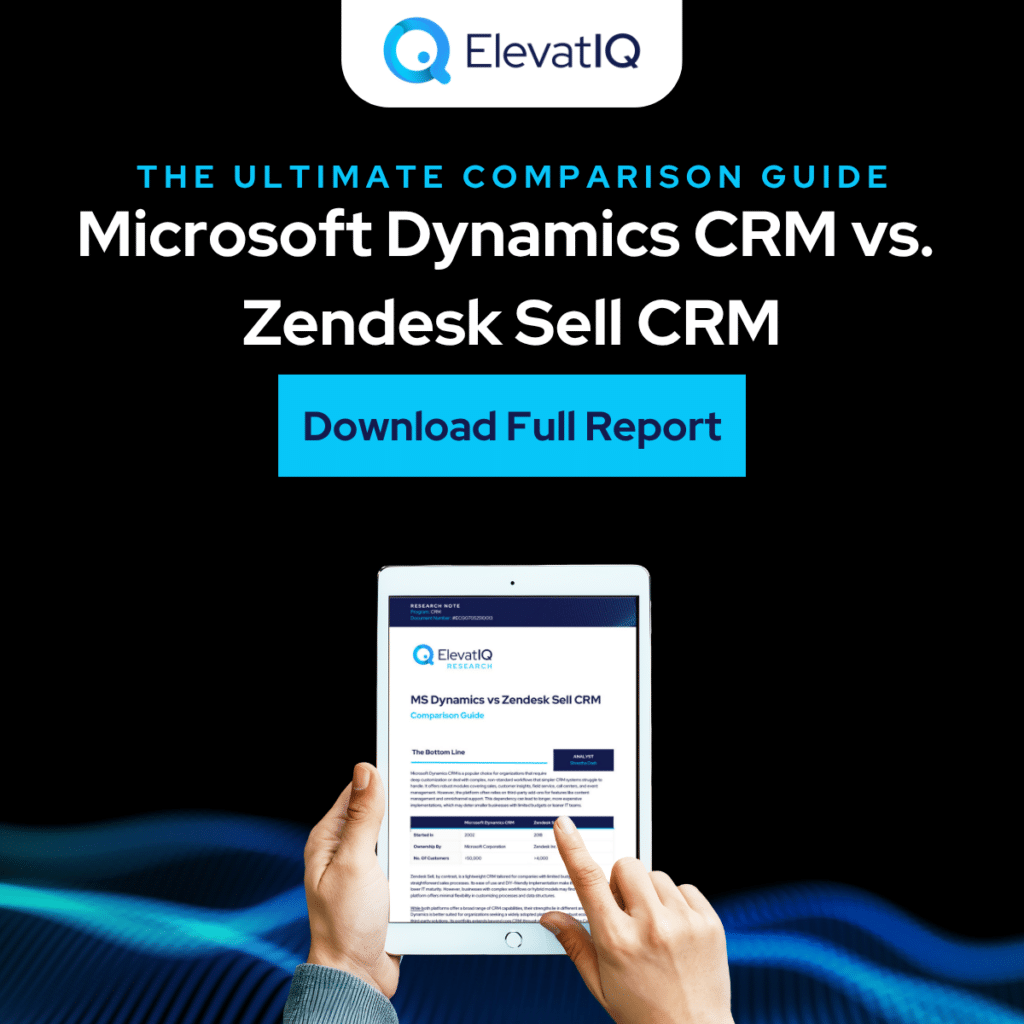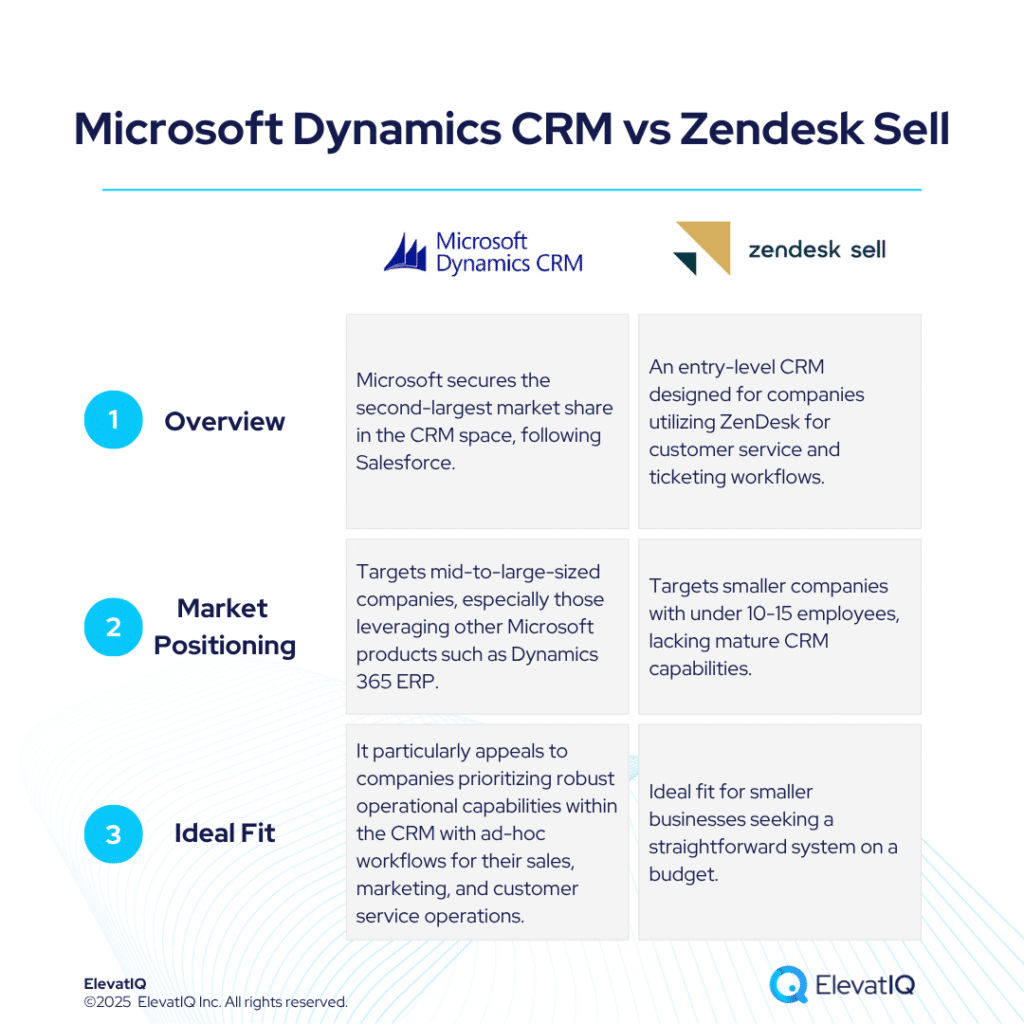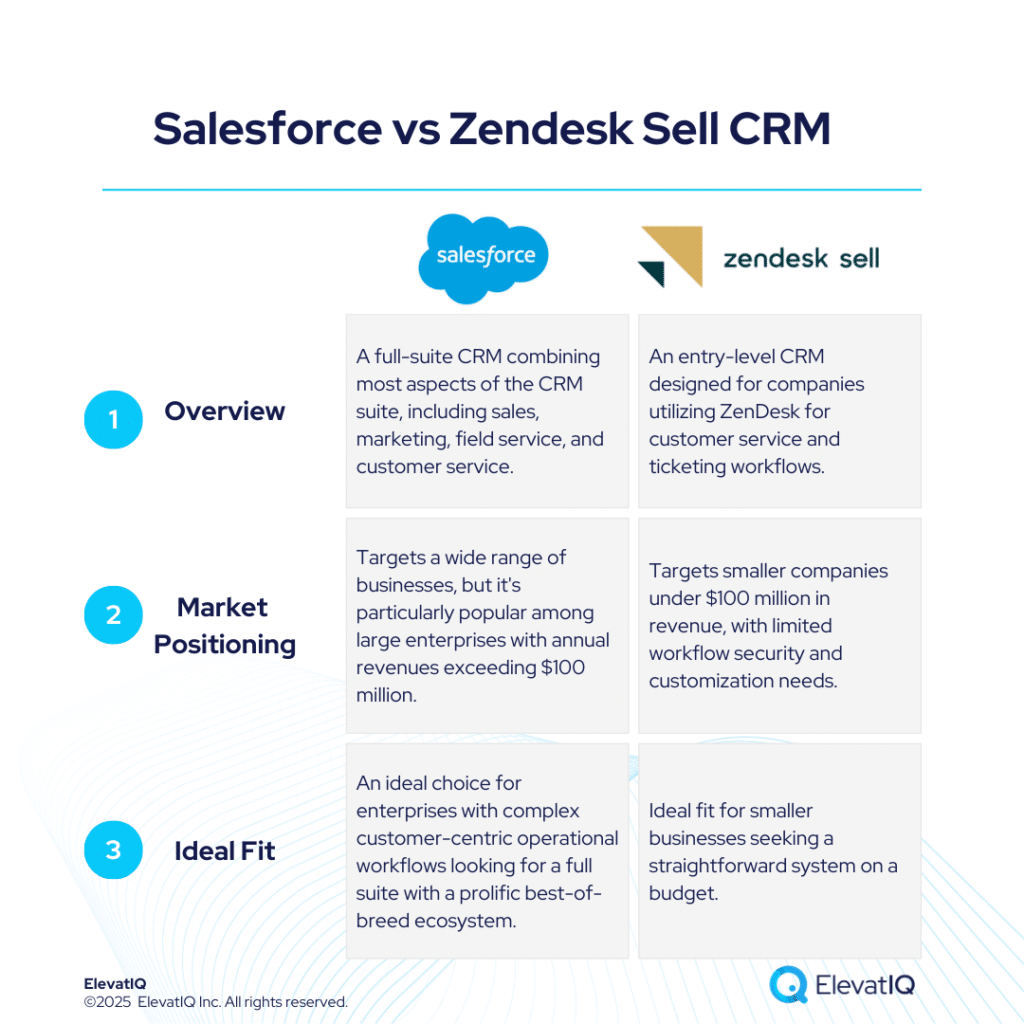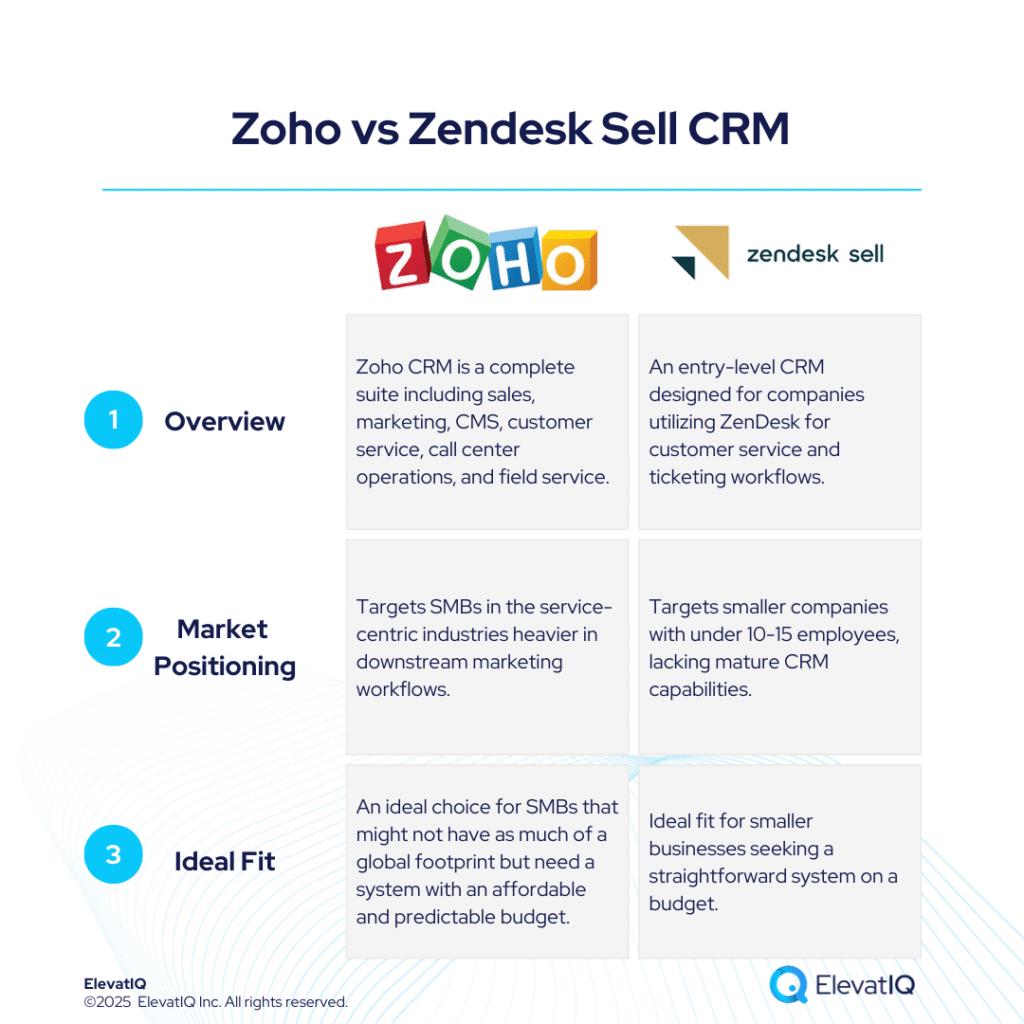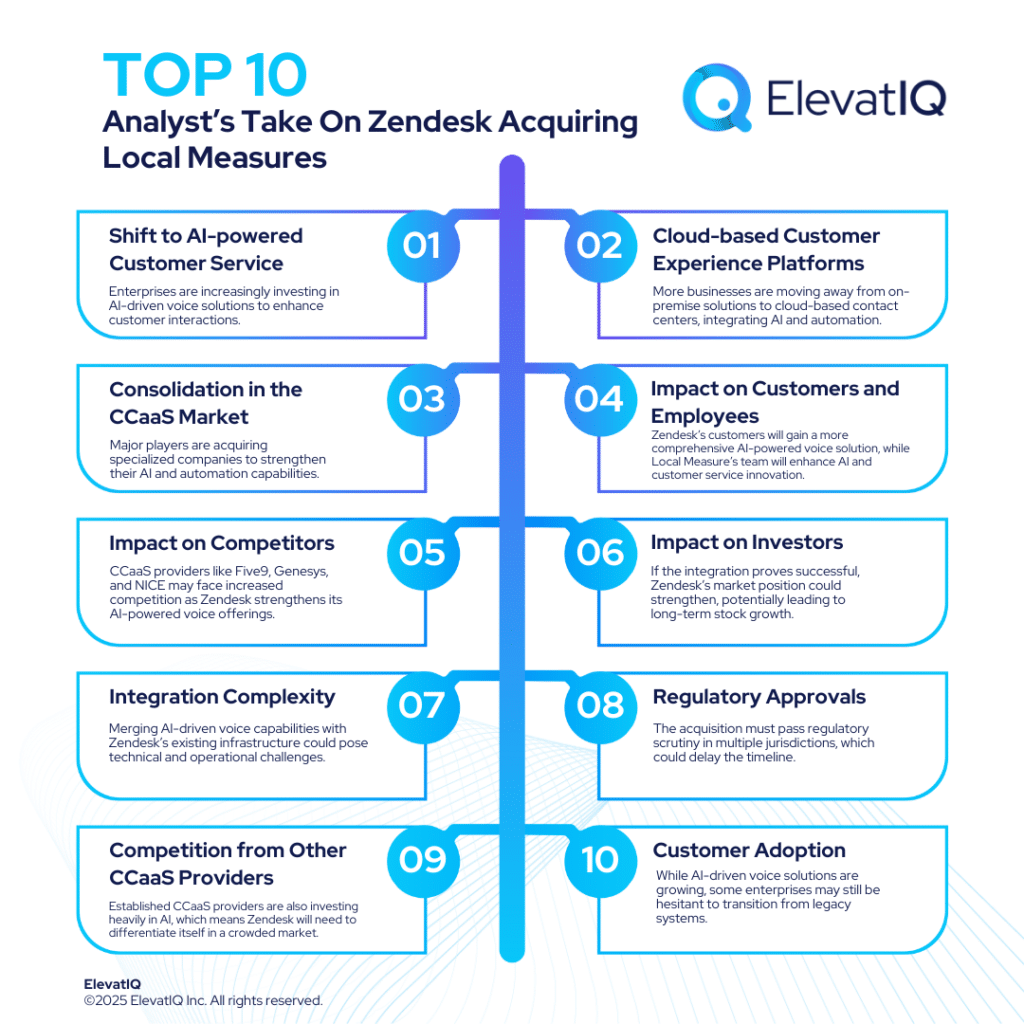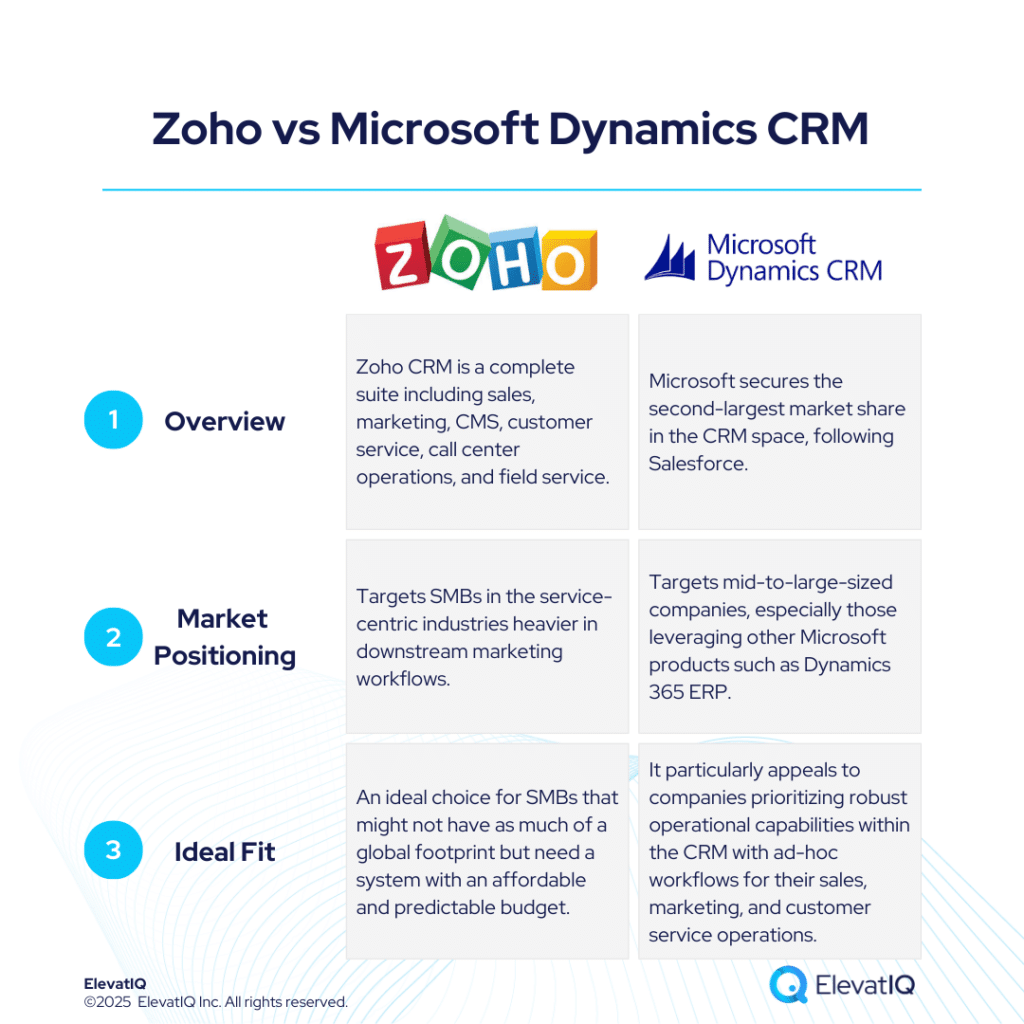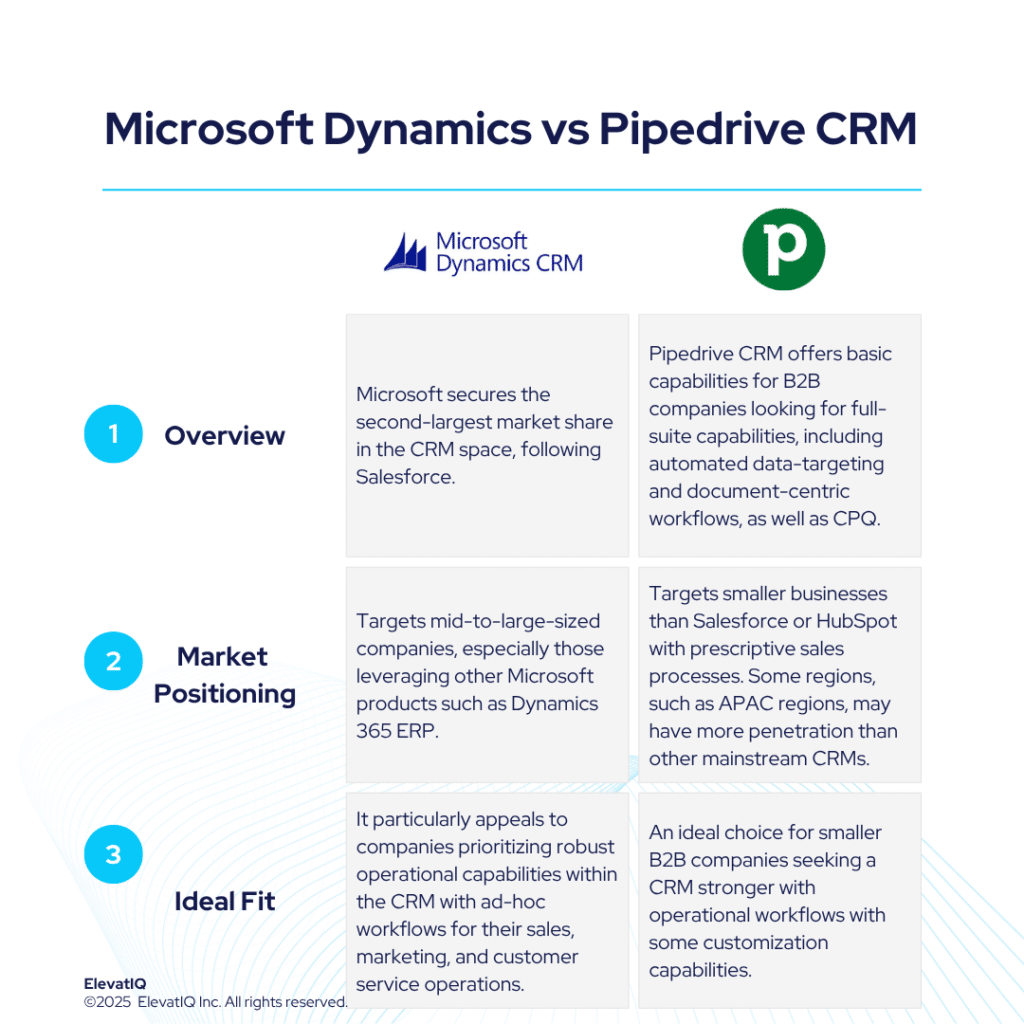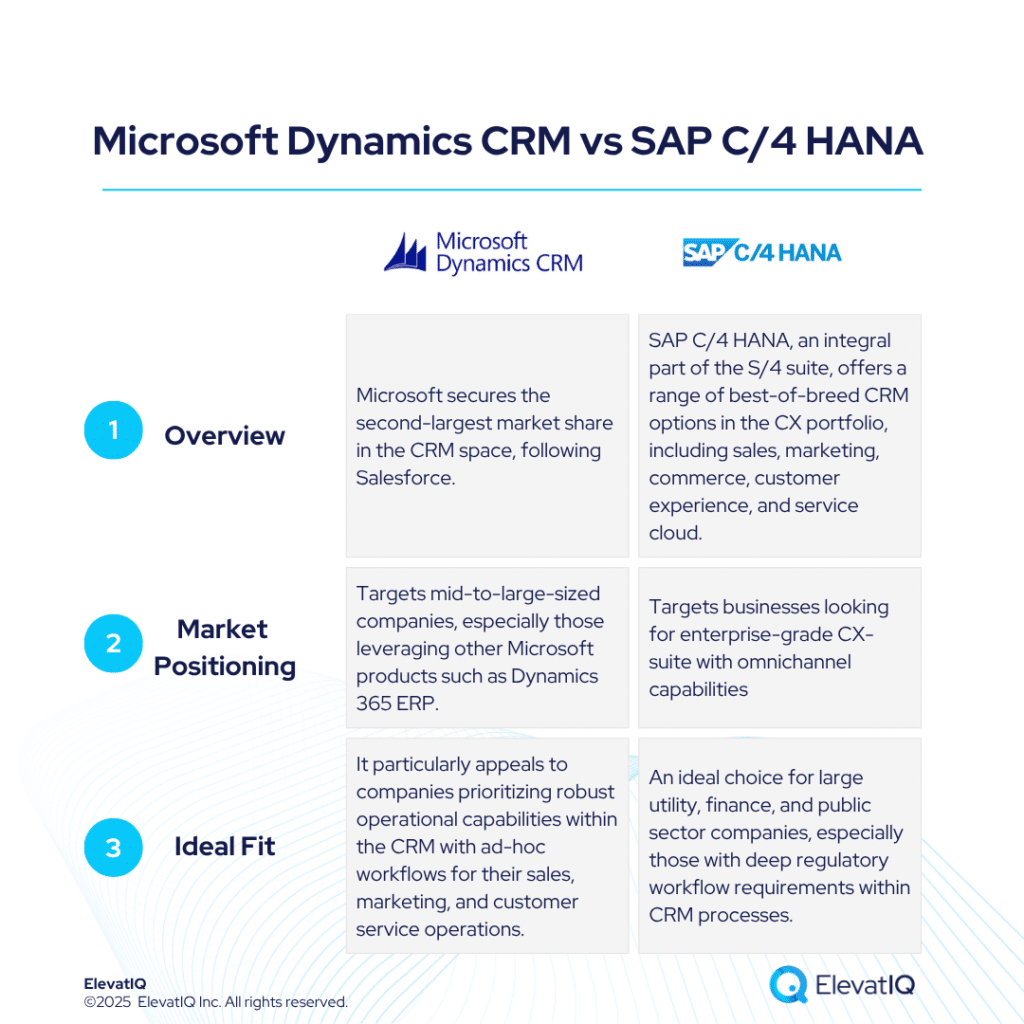Last Updated on July 10, 2025 by Sam Gupta
Microsoft Dynamics CRM is a leading choice for organizations that need deep customization and can handle complex, non-standard workflows that simpler CRM systems struggle with. Its robust suite of modules spans sales, customer insights, field service, call centers, and event management, making it a comprehensive solution for diverse business needs. However, Microsoft Dynamics CRM often depends on third-party add-ons to cover functionalities like content management and omnichannel support. This reliance can extend implementation timelines and increase costs, potentially making it less accessible for smaller businesses with limited budgets or lean IT teams.
In contrast, Zendesk Sell offers a lightweight, user-friendly CRM tailored to companies with straightforward sales processes and tighter budgets. Zendesk Sell’s ease of use and DIY implementation approach appeals to teams with lower IT maturity. However, its simplicity comes with trade-offs—companies with complex workflows or hybrid sales models might find the platform restrictive due to its limited flexibility in customizing processes and data structures. Zendesk Sell’s ecosystem is also smaller compared to Microsoft Dynamics, though it benefits from stronger ties to telco vendors, thanks to Zendesk’s flagship customer service product’s ecosystem.
While both platforms provide valuable CRM capabilities, their core strengths serve different audiences. Microsoft Dynamics CRM suits organizations seeking a widely adopted platform supported by a robust ecosystem of third-party solutions and integrated features like Call Center Cloud and Event Management—areas where Zendesk Sell typically falls short. Meanwhile, Zendesk Sell offers familiarity and integration for users already invested in Zendesk’s customer service tools, though it lacks the extensive third-party integration options found in Microsoft Dynamics. Ultimately, the choice hinges on whether your business prioritizes deep customization and operational breadth or simplicity and ease of use.
What Is Microsoft Dynamics CRM?
Microsoft Dynamics 365 stands out by offering a single, comprehensive CRM suite designed to integrate seamlessly with its various ERP products tailored to mid-market and enterprise needs. Unlike some platforms that separate their CRM offerings, Microsoft bundles core CRM, Customer Insights, and customer and field service solutions into one tightly integrated system. This deep integration with product and pricing data enhances data integrity but also adds complexity, often requiring significant consulting support during implementation. While competitors like Salesforce and HubSpot prioritize smooth onboarding with minimal external help, Dynamics 365 is better suited for organizations willing to invest in a robust, scalable CRM environment that supports complex workflows.
What truly differentiates Microsoft Dynamics 365 CRM is its sophisticated approach to Customer Insights, blending marketing automation with customer data platform (CDP) capabilities tailored to both B2B and B2C workflows. Businesses need to carefully evaluate if the platform aligns with their unique needs, especially given the distinct demands of B2B customer hierarchies versus the broader data integration requirements in B2C. Dynamics 365 also excels in managing marketing processes, particularly event workflows, providing end-to-end control without relying on third-party tools—a notable advantage over platforms like HubSpot or Salesforce. But how well does this complexity fit your organization’s structure? Can your teams handle the operational overhead that comes with such a powerful system? Are you prepared to invest in the necessary development and consulting support? Download the Ultimate Microsoft Dynamics CRM vs Zendesk Sell Comparison Guide now to explore these factors in depth.
What Is Zendesk Sell CRM?
Zendesk Sell CRM is designed as an entry-level solution that caters primarily to budget-conscious small and midsize businesses (SMBs). It offers customizable workflows and user-friendly integration options that don’t require deep technical expertise, making it accessible for teams without developer resources. However, the platform lacks advanced customization capabilities and enterprise-grade application development features, which can limit its scalability for growing or complex organizations.
The Zendesk object model aligns closely with industries that already use Zendesk’s customer service tools—such as tech, media, and telecommunications—where call centers and customer support play a central role. Its simpler structure and workflow security make it easier and quicker to implement, especially for companies operating on tight budgets. That said, because Zendesk prioritizes its flagship customer service product, Zendesk Sell users sometimes experience less dedicated support and slower feature development. Are you looking for a straightforward, cost-effective CRM with basic customization? Or do you need a platform that can grow with your business and offer robust enterprise capabilities? How important is vendor support and ongoing product innovation to your CRM strategy? Download the Ultimate Microsoft Dynamics CRM vs Zendesk Sell Comparison Guide now to get a detailed side-by-side look.
Microsoft Dynamics CRM vs Zendesk Sell Comparison
Microsoft Dynamics CRM offers a comprehensive and extensive data model designed to support the complex requirements of a wide range of industries and business models. It supports advanced CRM capabilities such as AI-powered insights, unified customer data platforms, and highly customizable workflows. The platform’s ecosystem is strong, particularly with seamless integration across Microsoft products, although it may not be the first choice for upstream marketing vendors. Dynamics CRM also boasts robust operational features, including territory planning, global compliance, and complex CPQ processes, making it well-suited for enterprises with sophisticated sales and operational needs. Additionally, its pricing model is straightforward and easy to forecast, based on per-user and per-app tiers.
In contrast, Zendesk Sell CRM has a more limited data model and focuses on simpler, budget-friendly CRM features like basic reporting, CSV import/export, and revenue operations planning. Its ecosystem is concentrated within telecom and customer experience vendors but lacks broad appeal among marketing technology providers. While it follows an integration model similar to Salesforce, Zendesk Sell’s operational capabilities, territory management, and compensation planning are less advanced and may not meet the needs of industries requiring out-of-the-box robustness. Given these differences, which platform aligns best with your organization’s data complexity and operational needs? How important are AI-powered features and deep customization to your CRM strategy? Is ease of integration with existing Microsoft tools a priority, or would a lighter, more straightforward system suffice? Download the Ultimate Microsoft Dynamics CRM vs Zendesk Sell Comparison Guide now to get a detailed analysis.
Microsoft Dynamics CRM vs Zendesk Sell Module Comparison
Both platforms provide a wide range of features and functionalities aimed at streamlining business operations and boosting efficiency. In this comparison, we focus on the unique strengths of Microsoft Dynamics CRM versus Zendesk Sell across several key areas, offering insights to help businesses make well-informed CRM choices. This section covers features within essential modules, including marketing, sales, customer service, and e-commerce.
Marketing
Microsoft Dynamics CRM provides a robust set of marketing tools designed to support comprehensive content creation and management. Users can create reusable content blocks for consistent branding across multiple campaigns, while also leveraging built-in SEO metadata management to optimize site maps and page metadata. The platform also offers centralized social media management, enabling marketers to oversee multiple accounts from a single interface. Additionally, Dynamics CRM includes advanced email marketing capabilities that allow users to design, schedule, and send targeted campaigns within the system.
In contrast, Zendesk Sell CRM takes a more streamlined approach with limited dedicated marketing tools. It lacks built-in content creation, SEO, and social media management features, focusing instead on integrating with existing email platforms and supporting bulk email sending alongside automated email sequences. This makes Zendesk Sell a simpler option for teams that rely on external marketing tools. Does your business require an all-in-one marketing suite with built-in SEO and social media capabilities, or can you operate effectively using integrations with external platforms? How important is centralized management of your marketing channels? Would advanced email marketing tools within your CRM improve campaign effectiveness? Download the Ultimate Microsoft Dynamics CRM vs Zendesk Sell Comparison Guide now to explore these questions.
Sales
Microsoft Dynamics CRM offers a comprehensive suite of sales features designed to streamline lead management and sales pipeline visibility. It enables businesses to capture, score, nurture, and convert leads into opportunities with precision. The platform also provides a clear, visual representation of the sales process, along with robust email tracking to monitor and analyze communications. Additionally, Dynamics CRM supports efficient meeting scheduling and offers integrated collaboration tools to enhance teamwork and communication across departments.
Zendesk Sell CRM, while more simplified, still supports effective lead management by helping teams build targeted prospect lists and create customized follow-up sequences. It offers pipeline visibility and email performance tracking through integrations with existing email platforms. Although it lacks a dedicated meeting scheduling tool, it can manage appointments and tasks, and provides collaboration features like logging calls and syncing customer information across sales and support teams. Are your sales processes complex enough to benefit from advanced lead scoring and pipeline visualization? How critical is integrated meeting scheduling and built-in collaboration for your team’s productivity? Would seamless email tracking within your CRM improve your sales outreach? Download the Ultimate Microsoft Dynamics CRM vs Zendesk Sell Comparison Guide now to dive deeper into these questions.

Customer Service
Microsoft Dynamics CRM provides a comprehensive customer service suite, including a robust ticketing system, live chat functionality, and automated workflows with escalation rules and predefined response templates. Its omnichannel support enables businesses to manage customer interactions seamlessly across various channels, complemented by a self-service portal that empowers customers to find solutions independently. These integrated tools help organizations deliver efficient, consistent, and personalized support experiences directly within the Dynamics 365 environment.
Zendesk Sell, on the other hand, relies on its close integration with Zendesk Support to provide similar customer service capabilities, including ticketing, live chat, automation, and omni-channel engagement. While this setup allows Zendesk Sell users to benefit from powerful support features, it requires managing multiple platforms, which may add complexity for some teams. Are you looking for a CRM with fully integrated, all-in-one customer service tools? Would your team benefit from seamless omni-channel support and self-service portals built directly into the CRM? How important is having native automation and escalation workflows to your support strategy? Download the Ultimate Microsoft Dynamics CRM vs Zendesk Sell Comparison Guide now to explore these considerations.
E-commerce
Microsoft Dynamics CRM offers a robust set of commerce-focused features that go beyond basic CRM functionality. It enables businesses to create and manage comprehensive product catalogs, seamlessly integrate with Dynamics 365 Supply Chain Management for efficient order fulfillment, and deliver highly personalized shopping experiences. With capabilities like customer segmentation, targeted marketing, and AI-driven recommendations, Dynamics CRM empowers organizations to craft tailored buyer journeys that boost engagement and drive revenue.
In contrast, Zendesk Sell CRM does not natively support product catalog management, order fulfillment, or personalized shopping experiences. This makes it less suitable for organizations with complex product offerings or integrated commerce workflows. If your business relies on detailed product data, supply chain coordination, or personalized marketing, Zendesk Sell may require additional tools or custom integrations to meet your needs. How important are native commerce capabilities within your CRM? Would deeper integration between sales and fulfillment functions enhance your customer experience? Is your team ready to scale with a platform built for both CRM and e-commerce workflows? Download the Ultimate Microsoft Dynamics CRM vs Zendesk Sell Comparison Guide now.
Microsoft Dynamics CRM vs Zendesk Sell Pros
Microsoft Dynamics CRM is built to support complex business environments, particularly those operating in regulated industries or managing intricate sales hierarchies. With features like database-level replication and a shared common data model, it provides the foundation needed for enterprise-grade data governance and operational consistency. Its tight integration with other Microsoft products enhances cross-platform functionality, while its advanced capabilities in territory management and global sales compensation planning make it ideal for larger organizations with sophisticated go-to-market strategies.
Zendesk Sell CRM, on the other hand, caters to startups and SMBs seeking simplicity and speed. Its user-friendly interface is well-suited for sales development reps running multi-touch campaigns, and it’s especially attractive to teams with limited technical resources. While it includes some advanced features relative to its market segment, it lacks the depth and scalability that larger or fast-growing companies may require. Is your organization in need of enterprise-level control and integration, or do you prioritize ease of use and quick adoption? How critical are territory planning and compensation tools to your sales operations? Download the Ultimate Microsoft Dynamics CRM vs Zendesk Sell Comparison Guide now.

Microsoft Dynamics CRM vs Zendesk Sell Cons
Microsoft Dynamics CRM offers a powerful but complex environment, with tightly connected objects that ensure consistency across modules like sales, service, and marketing. However, this rigidity can also result in usability challenges, especially for teams that value flexibility and intuitive interfaces. Importing data such as opportunities and leads from external systems can be less straightforward, and the lack of intuitive CSV support may add friction to day-to-day operations. That said, the platform remains a solid choice for businesses that prioritize structure, data governance, and a unified enterprise ecosystem.
Zendesk Sell CRM, while more approachable for smaller teams, comes with its own limitations. Its integration with Zendesk Support is not as seamless as users might expect, and its marketing automation features lag behind other CRM leaders. Users have reported occasional glitches, and its lean capabilities in areas like territory planning can hinder more advanced sales organizations. Does your business prioritize deep platform integration or ease of use? Are your sales teams equipped to work within a structured environment, or would they benefit more from a lighter, more agile tool? Download the Ultimate Microsoft Dynamics CRM vs Zendesk Sell Comparison Guide now.
Download the Full Research Report
